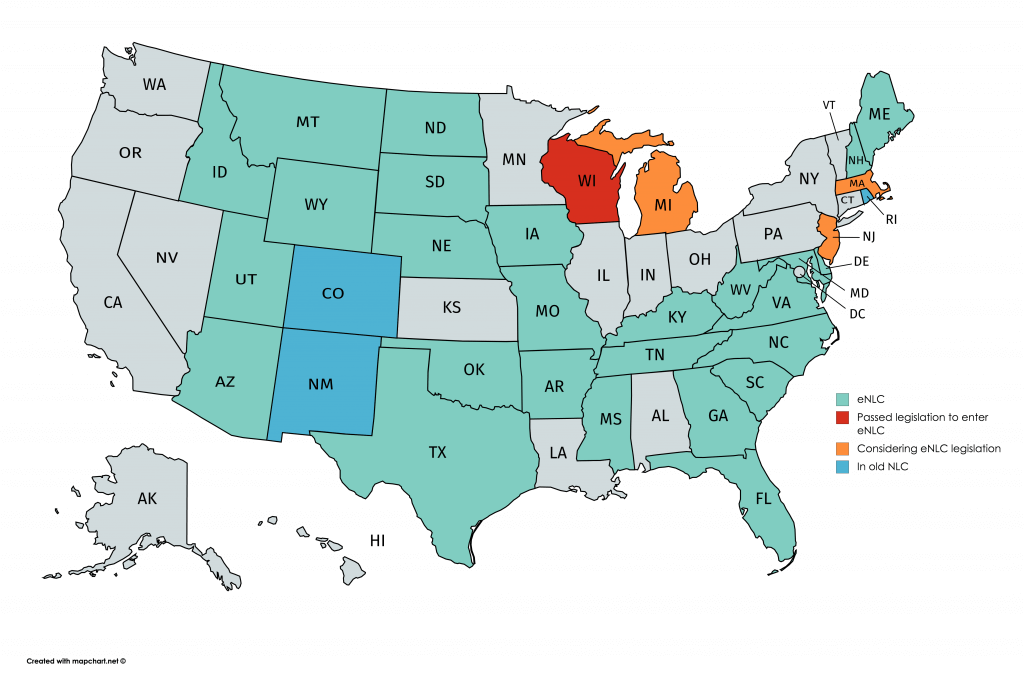As you may have heard, the Nurse Licensure Compact is evolving. Here’s how it’s different, what states are impacted, and what it all means for you.
How is the Compact Nursing License changing?
As of July, the majority of states in the old Nurse Licensure Compact (NLC) have adopted the new and improved Enhanced Nurse Licensure Compact (eNLC).
The eNLC makes important updates to licensure requirements, makes criminal background checks mandatory, and establishes an Interstate Commission of Nurse Licensure Compact Administrators.
The policy changes went into effect July 20, 2017, and they will begin being implemented on January 19, 2018. This is when nurses holding eNLC multistate licenses can begin practicing in eNLC states and when the Commission will begin to issue new nursing licenses.
So, which states are in the eNLC?
As of November 8, 2017, 26 states have adopted the new legislation. Wisconsin will also soon be entering into the eNLC, according to a representative from Senator Marklein’s office. (Senator Marklein introduced the senate bill to enter Wisconsin into the eNLC).
Massachusetts, Michigan, and New Jersey are considering legislation which would bring them into the new compact. Colorado, New Mexico, and Rhode Island are the members of the old NLC who have not yet joined the eNLC. These states will remain in a compact with each other until there are fewer than two states in the old compact.
For updates, visit this eNLC map.
eNLC Status by State
| States in the new eNLC as of November 8, 2017 *indicates states that were not in the old NLC † legislation passed |
States that may join the eNLC by January 19, 2018 (pending legislation) | States remaining in the old NLC as of November 8, 2017 | States in no compact |
|
|
|
|
How does this impact you?
If your license is from a state that moved from the NLC to the eNLC and you received your license before July 20, 2017, you don’t need to do anything.*
If your license is from a state that moved from the NLC to the eNLC and you received your license after July 20, 2017, you will need to demonstrate that you meet all new requirements (listed below).*
If your license is from a state that is new to the eNLC and was not in the old NLC, your home state will send you information on how to become compliant with eNLC rules. These states are: Florida, Georgia, Oklahoma, West Virginia, and Wyoming. (Congrats! There are now 25 other states you can travel to!)
If your license is from a state that is remaining in the old NLC and has not passed legislation to move to the eNLC, you will lose multistate privileges, except for other states in the old NLC. These states are: Colorado, New Mexico, and Rhode Island. You will need to obtain a single state license to travel to states outside the old NLC.
*Note: If your state moved from the NLC to the eNLC, you will no longer be able to practice in Colorado, New Mexico, and Rhode Island under your multistate license, unless and until they join the eNLC. You will need to obtain a single state license to travel to these states.
Updated nursing licensure requirements
Here are the 11 uniform licensure requirements for a multistate license under the eNLC:
- Meets the requirements for licensure in the home state (state of residency)
- (a) Has graduated from a board-approved education program; or
(b) has graduated from an international education program (approved by the authorized accrediting body in the applicable country and verified by an independent credentials review agency) - Has passed an English proficiency examination (applies to graduates of an international education program not taught in English or if English is not the individual’s native language)
- Has passed an NCLEX-RN® or NCLEX-PN® Examination or predecessor exam
- Is eligible for or holds an active, unencumbered license (i.e., without active discipline)
- Has submitted to state and federal fingerprint-based criminal background checks
- Has no state or federal felony convictions
- Has no misdemeanor convictions related to the practice of nursing (determined on a case-by-case basis)
- Is not currently a participant in an alternative program
- Is required to self-disclose current participation in an alternative program
- Has a valid United States Social Security number
Source: National Council of State Boards of Nursing
Have any more questions? Visit the NCSBN’s frequently asked questions about the eNLC or contact us!
If you’d like to see more articles on Tips and Insights, click here.
